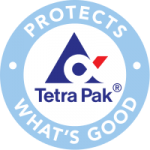Waste Reduction Week in Canada: Tetra Pak marks occasion with new initiatives
Carton packaging company shows committment to waste reduction and recycling

Waste Reduction Week, a yearly national initiative, is taking place this week, from October 17 – 21, 2011 (www.wrwcanada.com). This initiative endeavours to raise awareness about the environmental impact of waste.
Tetra Pak, a leading food packaging and processing manufacturing company, has significantly increased its efforts to reduce waste by establishing aggressive global sustainability goals. As part of its global 2020 strategy, Tetra Pak has committed to cap carbon emissions at 2010 levels and double the recycling rate of used beverage cartons.
In Canada, Tetra Pak is actively pursuing ways to reduce waste by supporting school recycling initiatives, assisting away-from-home recycling programs, launching industry initiatives, working with domestic material recycling facilities and developing viable end markets for carton fibre.
Supporting School Recycling Initiatives
In Ontario, an average student’s lunch generates a total of 30 kilograms of waste per school year, which equates to the weight of a second grade child. Tetra Pak Canada has joined forces with Metro Ontario Inc. to support the Waste-Free Lunch Challenge, a school program developed by the Recycling Council of Ontario to educate students, staff and parents about waste reduction.
The program coincides with Waste Reduction Week and challenges students to bring waste-free lunches. It also puts participating schools and classrooms in competition to produce the least amount of waste.
“Tetra Pak is actively working to grow carton recycling in Canada, and we are proud to support programs like the Waste-Free Lunch Challenge that promote waste reduction strategies,” said Elisabeth Comere, Director, Environment and Government Affairs, Tetra Pak Inc.
“As a concerned carton manufacturer, it is our responsibility to ensure that staff, parents and kids understand that carton packages like milk and juice boxes are recyclable.”
As part of the program, Tetra Pak will support the advancement of carton recycling education and awareness, and assist with school recycling audits to understand how schools are organized in terms of recycling access and performance. This information will help Tetra Pak fine-tune its recycling strategy to increase the national carton recycling rate.
“The Recycling Council of Ontario is pleased to have Tetra Pak join us in our mission to reduce the amount of waste produced from schools,” said Jo-Anne St. Godard, Executive Director, Recycling Council of Ontario. “Tetra Pak’s investment in the Waste-Free Lunch program, particularly expanding carton recycling, demonstrates their commitment as a steward of their package.”
To find out more information on the Waste-Free Lunch Challenge, please visit www.wastefreelunch.com and to find out more about Waste Reduction week, please visit www.wrwcanada.com.
Assisting Away-from-Home Recycling Programs
Furthermore, in addition to supporting the Waste-Free Lunch Challenge, Tetra Pak previously partnered with Metro to support Play Soccer, an Ontario-based community program.
Throughout the 2011 summer soccer season, Metro and Tetra Pak worked to increase and encourage responsible recycling by providing coaches, parents and kids with on-site recycling facilities and information about community recycling programs. The program was designed to educate and motivate Ontarians to learn about and use their local recycling facilities to effectively increase away-from-home recycling.
Tetra Pak will continue to look into supporting other away-from-home recycling programs and initiatives.
Launching Industry Initiatives
Earlier this year, Tetra Pak joined together with three other leading carton manufacturing companies to form the Carton Council of Canada, a national organization committed to increasing sustainable carton recycling solutions by promoting recycling technology and local collection programs to divert cartons from landfills. Currently, the Carton Council of Canada is looking for ways to drive away-from-home recycling programs.
“Associations help drive public awareness and facilitate the advancement of important issues,” said Comere. “Though we are proud of the environmental profile of our products and are committed to optimizing the end-of-life management of used cartons, we cannot do it alone. The Carton Council of Canada will work with key stakeholders to advance carton recycling solutions and encourage Canadians to increase recycling rates by using their local facilities.”
Working with Material Recycling Facilities
Nearly 94 per cent of Canadians have access to carton recycling solutions; however, only 43 per cent of cartons are recycled nationwide. Tetra Pak alongside the Carton Council of Canada is attempting to close the gap by working with material recycling facilities to carry out waste audits that identify and address key issues impacting carton recycling. By aligning with recycling professionals and paper mills, Tetra Pak alongside the Carton Council of Canada is providing resources to build a sustainable carton recycling supply chain.
Developing Viable End Markets for Carton Fibre
Recycled carton paper fibres are a valuable resource for making new products. Once deposited or recycled and processed at a paper mill, recycled cartons are often turned into tissue or other useful and valuable paper products. Tetra Pak Canada works to reduce carton waste and make use of these fibres by actively supporting advancements in recycling technology. Tetra Pak supports sustainable recycling by helping sorting facilities upgrade and/or quickly adopt the equipment changes needed to successfully incorporate cartons into recycling systems.
Most recently, Tetra Pak partnered with Quebec-based recycling company, Groupe RCM, to invest in a new recycling line that converts cartons, plastic bags and films into useful post-consumer products such as flower pots, railway ties and plastic lumber.
Tetra Pak, alongside the Carton Council of Canada, is also working to build robust end markets in the U.S. and Mexico, which accept tonnage from Canada. By providing marketplace assistance for the guaranteed movement of cartons, Tetra Pak is supporting the commodity value of high-quality fibre contained in cartons and building the marketplace pricing needed for sustainable recycling.
“We are proud of our ongoing efforts to encourage waste reduction at the municipal, provincial, national and international level,” said Comere. “We will continue to work hard to achieve our global sustainability goals and made a positive impact in Canada. We must all do our part to reduce our environmental footprint.”



